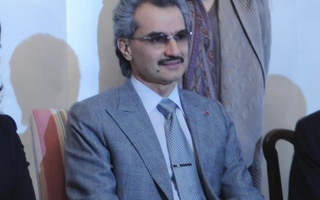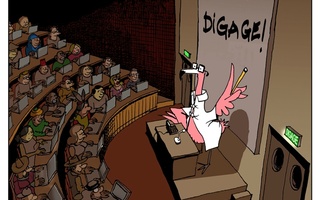Monolithic, separate, inferior, enemy, manipulative. These were the adjectives that the British think-tank Runnymede Trust found were commonly associated with Islamic communities in a 1997 report about social perceptions of Islam. Many years later, these biases have not disappeared on either side of the Atlantic. Last spring, the Joint Forces Staff College of the National Defense Unit was engulfed in scandal when Army Lieutenant Colonel Matthew Dooley presented deeply Islamophobic material in a course for military officers. Dooley said in a presentation that “[Muslims] hate everything you stand for and will never coexist with you, unless you submit.” NPR journalist Juan Williams had made remarks of a milder yet comparable nature at the end of 2010 while a guest on the O'Reilly Factor, saying that he would become nervous whenever seeing someone “in Muslim garb” on a plane.
In light of common misunderstandings of Islam that are unfortunately still present in U.S. society, the events organized on campus this month by the Harvard Islamic Society for its annual Islamic Awareness Month are a valuable initiative that prompts us to reflect on an important component of the American community. It is particularly salient that Islamic Awareness Month is organized by students from Harvard’s Muslim community: Much of our knowledge (and often misperception) of Islam is informed by non-Muslims, not by the voices of Muslims themselves. Beginning last Monday night with a talk by Lesley Hazleton called “What Muhammad Stood for,” Islamic Awareness Month is a good opportunity for students to become aware of the tenets and traditions of one of the largest religions in the world, which are all too often perceived to be at odds with the values of other cultural and religious traditions.
Hazleton has herself both written and spoken at length about stereotyping and misrepresentation of Islam, and it is fitting that she opened Islamic Awareness Month. Pointing to the frequent misconceptions that surround Islam in the English-speaking world, Hazleton has tackled such themes as the reasons behind the negative perception of hijab-wearers in European and North American societies and the commonalities between Islamic thought and diversely defined Western values.
Several other events planned as part of the Islamic Awareness Month promise to foster good discussion on the relationship between Islam and other belief systems, both religious and secular. Professor of Comparative Religion Diana L. Eck, who is not a member of the Muslim community at Harvard but serves as the director of the Pluralism Project, will speak on her longtime experience confronting religious diversity both within and outside of academia at a closing keynote address.
It is particularly heartening that Islamic Awareness Month is happening in the context of a broader discussion on faith, which has been occurring on campus through such events as the Atheist Coming Out Week that took place in February. We welcome Islamic Awareness Month as a contribution to an open and tolerant campus discourse about religion and spirituality.
Read more in Opinion
Public LivesRecommended Articles
-
 Saudi Prince Who Funded Harvard Program Visits
Saudi Prince Who Funded Harvard Program Visits -
The Actual Arab WinterSince 1949, American journalism on the Middle East has tended to concern itself with Israel’s security and, since 1979, political Islam. But these concerns encourage a shortsighted focus on surface-level political developments in the Arab world.
-
A Space for IndividualityThe new gay-friendly mosque creates a space for men and women to pray together as equals.
-
Lecture on Muhammad Kicks Off Islamic Awareness MonthIn celebration of its annual Islamic Awareness Month, the Harvard Islamic Society kicked off a series of events this week in order to bring attention to Islamic issues and the Muslim community at Harvard.
-
 Artist Spotlight: _Z_
Artist Spotlight: _Z_ -
Panel Discusses Portrayal of Muslims in MediaThe American media now portrays Muslims with the same negativity that it does North Korea and Moammar Gadhafi, founder and CEO of Media Tenor International Roland Schatz told a crowded CGIS auditorium Thursday.













